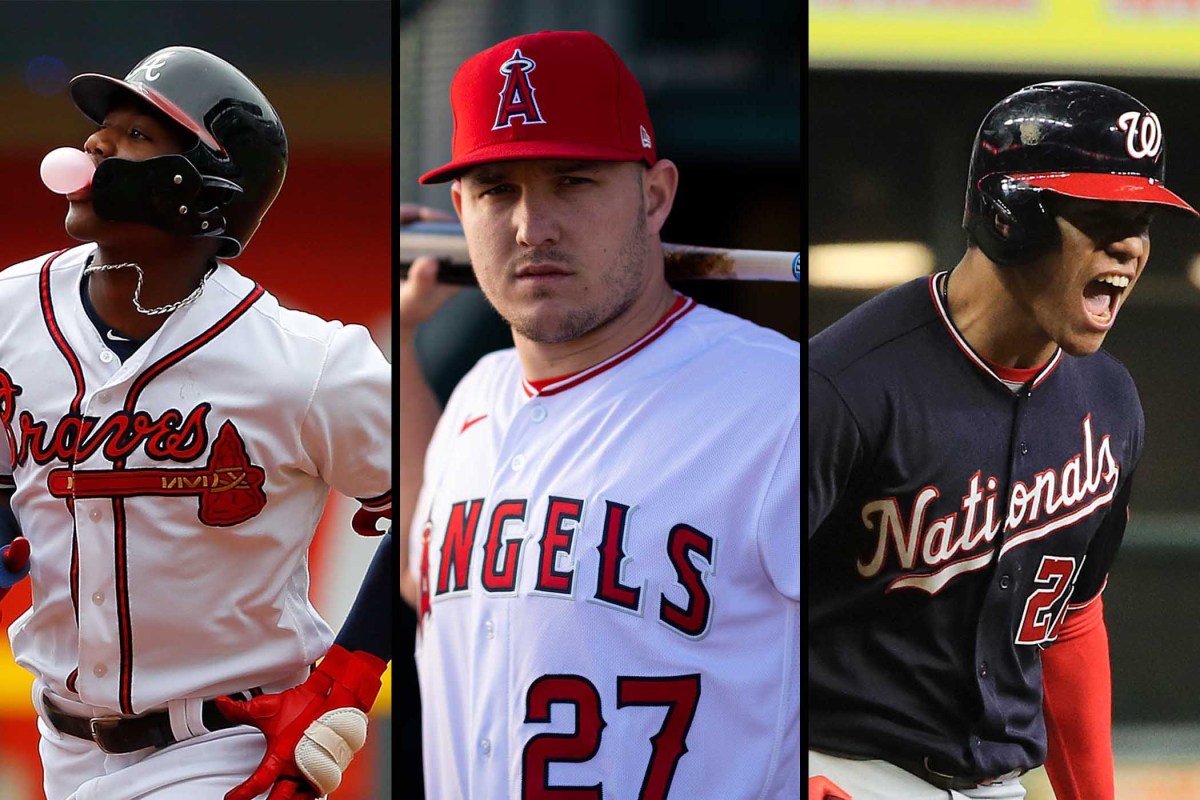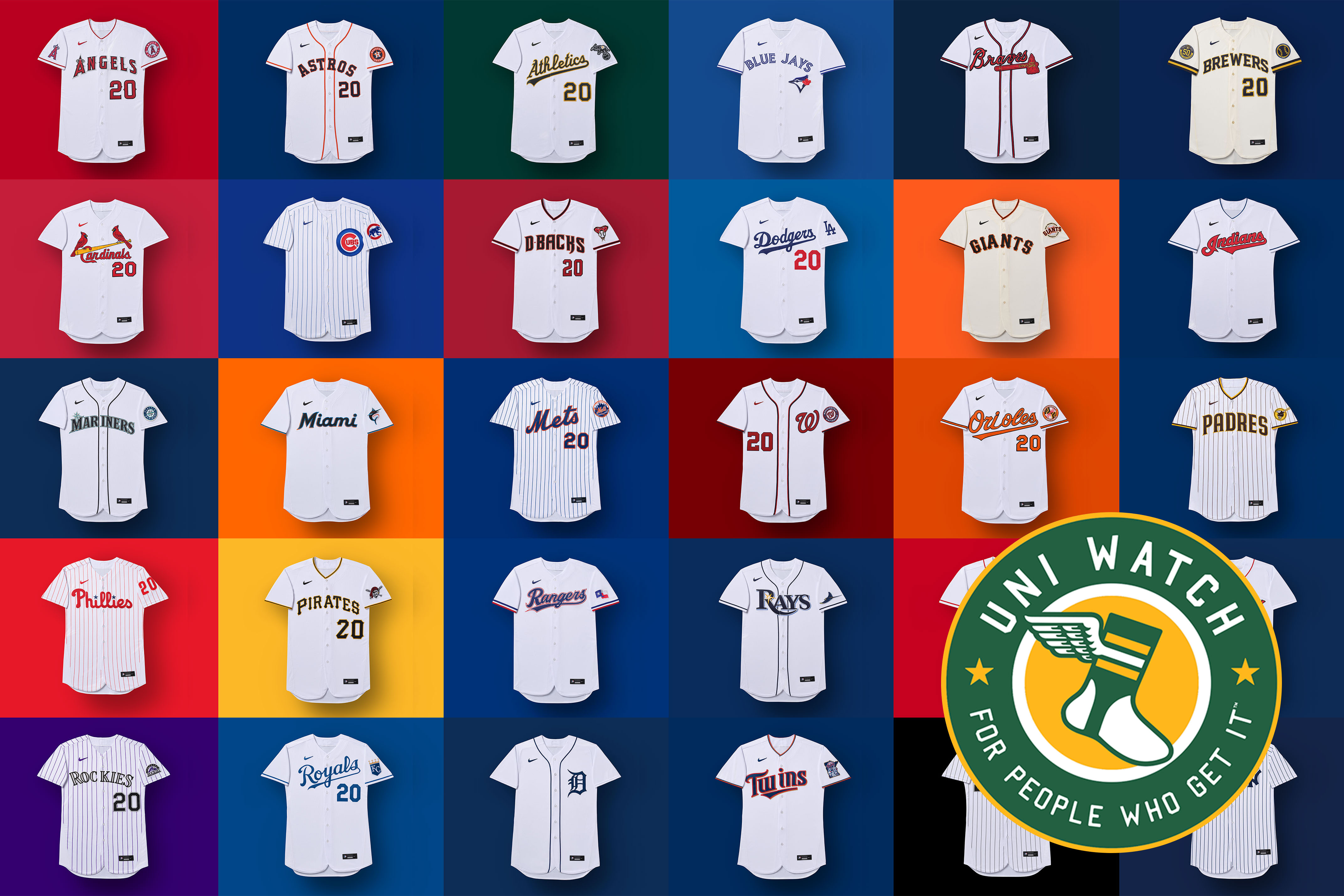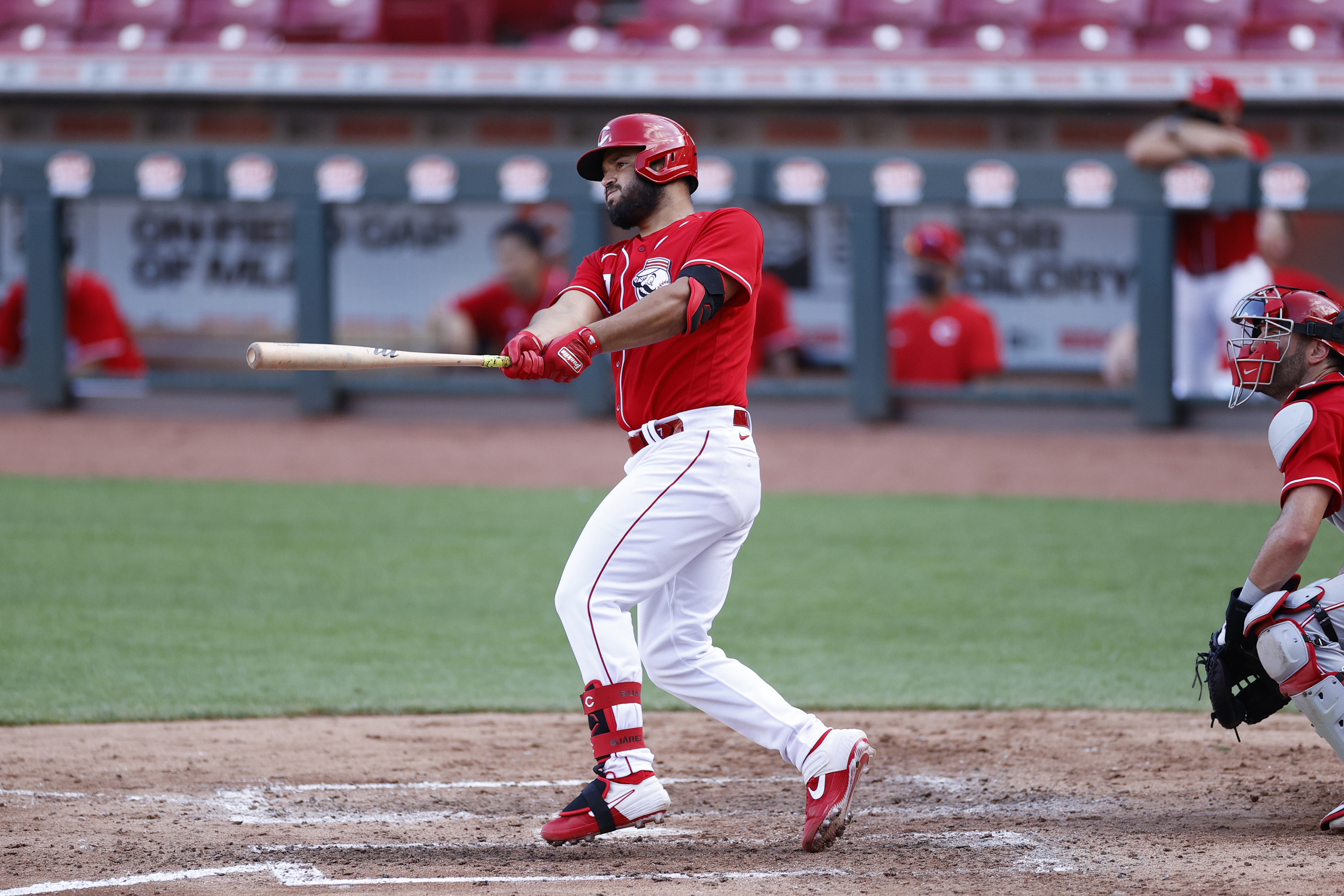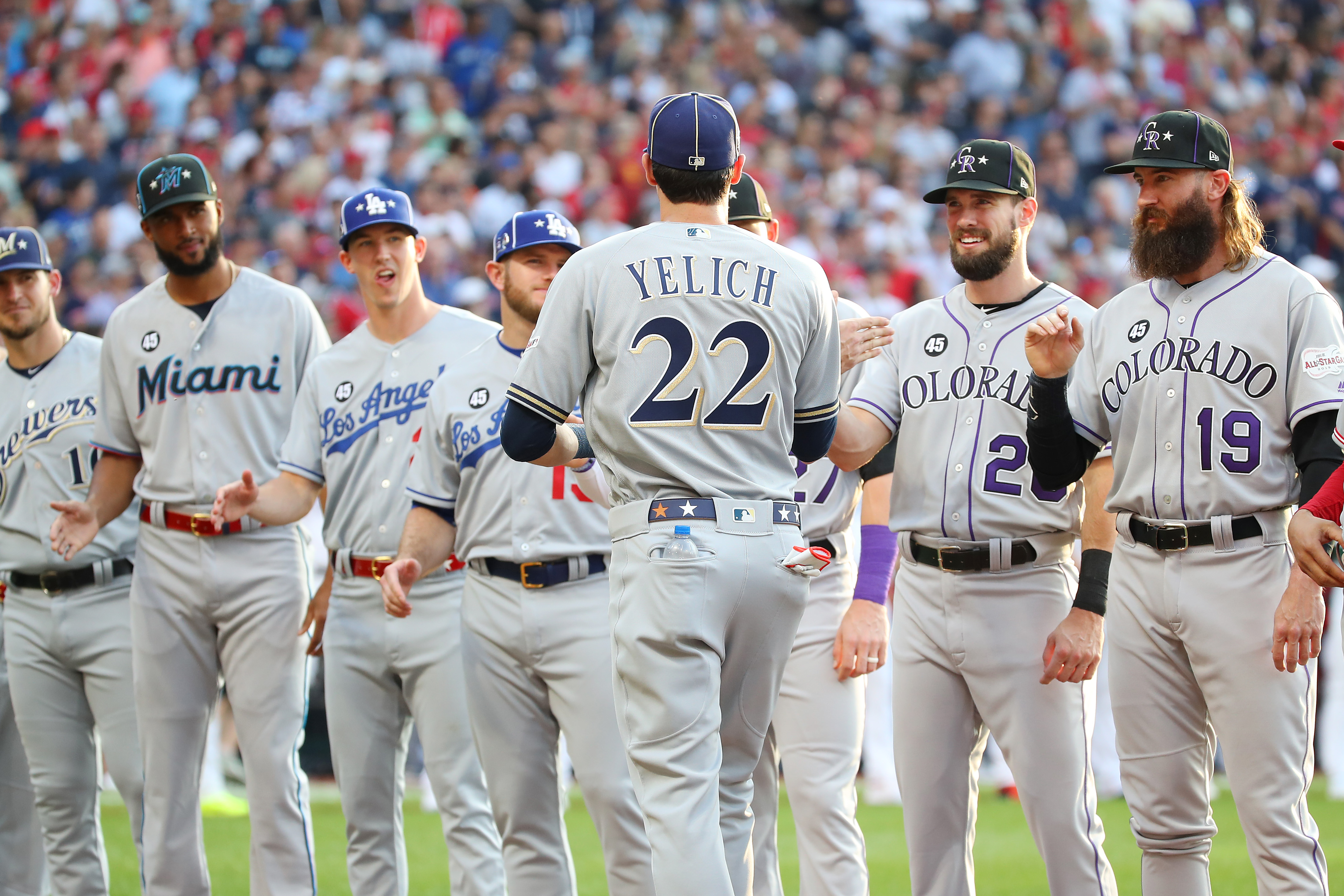We’ve made it.
Tonight, a half hour or so after Dr. Anthony Fauci throws out the first pitch, Aaron Hicks will step into the box at Nationals Park to face Max Scherzer and a wild experiment will be underway.
A league that spent the offseason thinking about trash-can banging, overly springy baseballs and the free-agency decisions of a few major stars is now educating its players on how long to wait to use the bathroom on a train after a teammate is finished.
This 60-game season will not take place in a bubble city. It will take place in geographical pockets around the country, and each team will travel up and down seaboards or through the Heartland dozens of times, getting all too familiar with peculiarities of their province before clashing with teams from other regions in a playoff that may never arrive.
What will a title mean in 2020? How will a year of hamstrung stats affect the record books? Will some of these temporary rule changes — most notably, the implementation of a designated hitter in the National League — endure for years to come? Can the owners and labor find common ground and repair their fractured relationship? How might MLB add its voice to the Black Lives Matter movement? And honestly, where the hell are the Toronto Blue Jays going to play? Because it’s not going to be Toronto.
The dog days of summer are usually when even diehard fans tune out for a bit. After four months of rooting hard for your team, it’s easier to take a break and rest vocal chords for the push in October. Not this year. We’ve got an all-out sprint on our hands, and despite what the writers and radio hosts like to say about the sport’s slow decline, MLB gameplay is actually flourishing at the moment thanks to an abundance of young, electrifying talent.
What follows is a primer to all of that talent. We’ve compiled a preview of the game’s 20 must-watch players in the 2020 season, predicting what to expect from each of them in the 60-game scramble ahead.
Mike Trout
Center Fielder, Los Angeles Angels
Mike Trout is only 27, but already has a higher career WAR than a long list of Hall of Famers who played until they were 40 (including Derek Jeter, Tony Gwynn and Larry Walker). Trout currently ranks second among active WAR leaders; the only player in front of him is his teammate and senior of 12 years, Albert Pujols. Let the endless, useless debates rage on why Trout’s stardom doesn’t correspond to his talent — even the MLB commissioner weighed in a couple years ago, suggesting that the Angels outfielder was unwilling to become the face of the game — but the production is absolutely unmatched. Keep an eye on how much WAR Trout can gobble up in a 60-game season; if he reaches 3.0 in 60 games, as projected by FanGraphs’ Steamer, that would equal about a full season of the Boston Red Sox’s slugger J.D. Martinez last year.
Shohei Ohtani
Designated Hitter and Pitcher, Los Angeles Angels
He’s healthy, finally. Schadenfreude has circled Trout’s star teammate, the so-called “Japanese Babe Ruth,” since he debuted for Anaheim in 2018. After consecutive season-ending surgeries (Tommy John in 2018, and bipartite patella in 2019), the non-believers smugly concluded that Ohtani’s two-way experiment was an enterprise of yesteryear. But the original UCL tear in his arm could’ve easily been from simple overuse in Japan and the stop-and-start nature of the sport affects most knees; at 25, and with only 210 games under his belt, it’s far too early give up on this dream. Especially, as — when he’s healthy — it’s working. Ohtani pitched to a 3.31 ERA over 10 games in 2018 (the league average last year was 4.51), and has splits of .286/31/95 over a 162-game average at the plate. According to the Angels, he’s ready to play both sides for the shortened season. And he got absolutely shredded during the offseason. This should be fun.
Juan Soto
Left Fielder, Washington Nationals
A quick summary of the pitchers Juan Soto hit home runs off of during wild-card Washington’s dream title run last autumn: Hyun-jin Ryu (the National League Cy Young runner-up in 2019), Clayton Kershaw, Justin Verlander and Gerrit Cole (twice). Soto is only 21 years old, and plays as if singlehandedly determined to stop Gen Z from choosing lacrosse. But his patience and poise are remarkable for his age, too. Through 266 games at the major league level, Soto has an OBP above .400. If he doesn’t like it, he won’t swing. When he does, it’s going a long, long way.
Javier Baez
Infielder, Chicago Cubs
Baez followed his MVP runner-up campaign in 2018 with some sold splits last year, collecting 6.0 WAR on .281/29/85 hitting. He’s still just 26 (he was called up super early in his career) and won’t be an unrestricted free agent until 2022. For a Chicago Cubs franchise that has puzzled its fans and the league at large since it ended the drought in 2016, locking Baez up for the long-term is a very good idea. Beyond his numbers, though, Baez is one among a small number of MLB players that could convince a channel-surfer to put down the remote and stick around. He’s got energy, he’s got flair, and his caught-stealing tags are as swaggy as the National Pastime can possibly be. For the uninitiated: check this out.
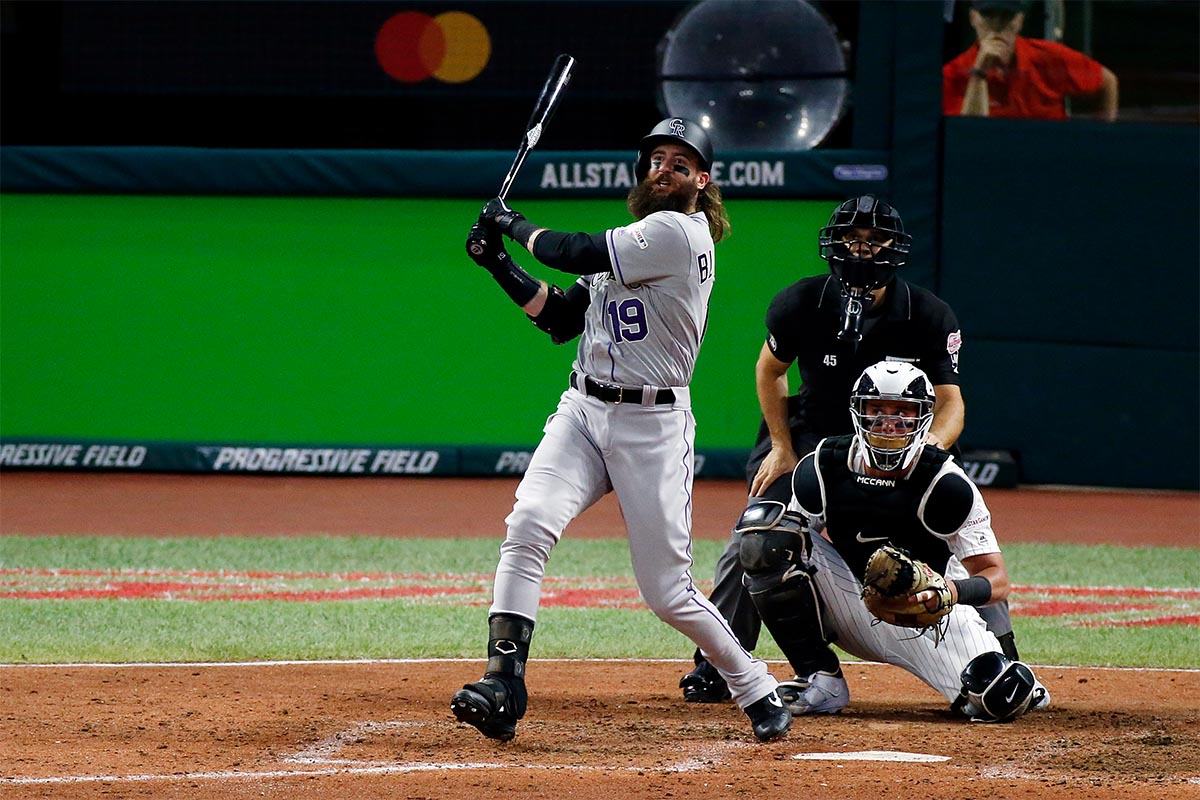
Charlie Blackmon
Outfielder, Colorado Rockies
Blackmon is a high-average hitter with a lot of hair who mashed a massive home run at the All-Star Game last year. Like everyone else on this list, he’s a great baseball player and worthy of your attention after months of no live American sports. But we’re most interested in his 2020 season for a less sporty reason, namely: How much is he going to spit? When Sports Illustrated informed Blackmon that spitting, using smokeless tobacco or chewing sunflower seeds in restricted areas is banned this year, he vowed to continue spitting regardless, and explained that it’s ingrained in his game. Blackmon’s expectorative efforts this year will be a fascinating test case for the league’s COVID-era policies.
Gerrit Cole
Pitcher, New York Yankees
The biggest contract for a pitcher ever. When the Yankees have a weakness — even during the thoughtful reign of Hal Steinbrenner, with his Camelot of Ivy-educated analysts — they commit a fortune to fix it. For Cole, that means $324 million paid out through the year 2028, and multiple-ring expectations. He seems to welcome it. A Yankee fan growing up with a battered sign to prove it, Cole had one of the best introductory press conferences in the franchise’s history, saying, “Pressure is a privilege.” All told, he won’t be able to bring the Yankees to the mountaintop on his own — he’ll log fewer than 20 starts this year, even assuming the club goes deep into the playoffs — but he can get them off to a good start. Cole will face off against Max Scherzer tonight in Washington, D.C.
Jacob deGrom
Pitcher, New York Mets
In the minds of many baseball experts, deGrom is the best pitcher in New York City — and by extension, the best pitcher in the entire league. There has been some speculation that a relief pitcher could compete for the Cy Young award this year in each league (they’ll certainly have more appearances, if not more pitches, to vie for it), but deGrom is a safe bet otherwise to win his third straight in Flushing. He is the merciless prime of his career, with an era of just 2.05 over his last 421 innings. Cole looked like Bob Gibson in the second half last year, and as a curious, borderline-obsessed student of the game, seems to be getting better. But deGrom has been on another planet for a little while now; he gave up the same amount of home runs in the last two years as Cole gave up in 2019 (29). Due to this year’s scheduling quirks, we’ll get to see the Subway Series a bit more than usual. Stay tuned for a titanic Cole-deGrom matchup.
Nolan Arenado
Third Baseman, Colorado Rockies
Nolan Arenado is a Gold-Glove third baseman. That’s not just an adjective, or an allusion to a single year in which Arenado brought home the award. Arenado, by contrast, always wins the Gold Glove. He has seven since debuting for the Rockies in 2013, and he’s managed them with a barrage of diving stops, bare-handed picks and powerful throws from his knees. That would be enough, if that was all the 29-year-old could do, but he also happens to be one of the best power hitters in the league, averaging 40 home runs per year over the last five seasons.
Josh Hader
Relief Pitcher, Milwaukee Brewers
In baseball, an “immaculate inning” is when a pitcher strikes out all three batters on nine consecutive pitches, with each pitch being a strike. The feat has occurred fewer than 100 times (nearly 4 million innings of baseball have been played since the 1870s) and clearly requires a bit of luck, but when Josh Hader pitched his way to the list last year, it came as little surprise to most Milwaukee Brewers fans. The truth is, most innings that Hader pitches are — if not immaculate — then at least tidy and eventless, which is the ultimate compliment you can give a relief pitcher. The lefty throws cross-body 98-MPH heat to tired batters, causing them to flail wildly or pop the ball straight up. When he gets an out, his long hair flies around and he skips excitedly about the mound. It’s fun to watch. If the Brewers are winning by a couple in the eighth, keep the game on.
Ronald Acuña Jr.
Outfielder, Atlanta Braves
We’ve been hearing about him forever, and for good reason. A former number-one-overall prospect for Baseball America, Acuña has made good on the hype with instant mashing at the major league level. In 2019, at just 21 years old, he hit .280/41/101. Braves fans, though, should be particularly excited this year about his speed. His bulldog frame — 6 feet, 180 pounds — puts a lot of balls over the wall, but also produces a ton of stolen bases. He swiped 37 last year, which put him tantalizingly close to the 40-40 club (populated right now only by Barry Bonds, Jose Canseco, Alex Rodriguez and Alfonso Soriano). It isn’t insane to suggest that Acuña could become the founding member of the 50-50 club in the coming years. This year, though, claustrophobic pennant races will craft a do-or-die mentality, and could compel teams to revert to small-ball methods of winning games. Acuña’s speed will come in handy.
Fernando Tatis Jr.
Shortstop, San Diego Padres
The most exciting infielder in San Diego isn’t named Manny Machado. He’s the son of journeyman utility player Fernando Tatis, and he’s going to be an NL MVP candidate for the next 15 years. Tatis only played 84 games last year before his season was cut short by a back injury in August, but he could’ve been on the field even less had the Padres kept him in the minors at the beginning to manipulate his service time. Thank goodness they didn’t. They recognized he had the talent to start right away, and he honored that decision with a .317 average, a splatter of extra-base hits (including six triples!), dazzling defense and an uncommon, borderline reckless desire to win games. Last summer, Tatis tagged up from third on a routine pop fly to second base, and scored … twice.
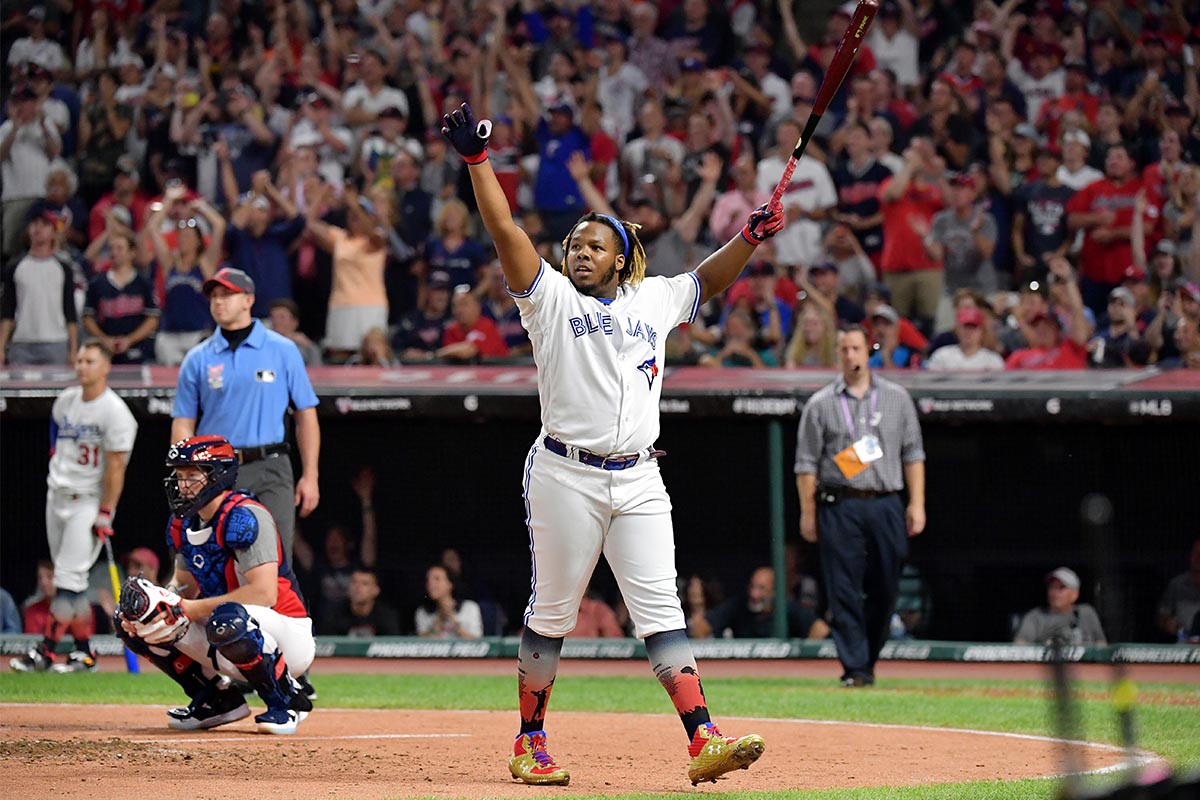
Vladimir Guerrero Jr.
Third Baseman and First Baseman, Toronto Blue Jays
The on-field production isn’t quite there yet from “Vladito,” the son of Hall of Famer Vladimir Guerrero. He finished sixth in the AL Rookie of the Year voting last year to cap off a promising first year for the Toronto Blue Jays (.272/15/69 and 1.5 WAR). But if that Home Run Derby performance was any indication — we called it the best Home Run Derby ever, and we stand by it — there is a preposterous amount of potential in Junior’s bat. The Blue Jays are an odd spinoff of early 2000s MLB right now (Guerrero is one of four baseball sons at the club, along with Cavan Biggio, Bo Bichette and Lourdes Gurriel Jr.), and according to recent reports, it’s going to be an even weirder year for their side than everyone else. The Canadian government isn’t comfortable with the Blue Jays playing in the Rogers Centre this year, so a search for a temporary home is under way. This will almost certainly hurt the team, so a strong showing from Guerrero Jr. regardless would say a lot.
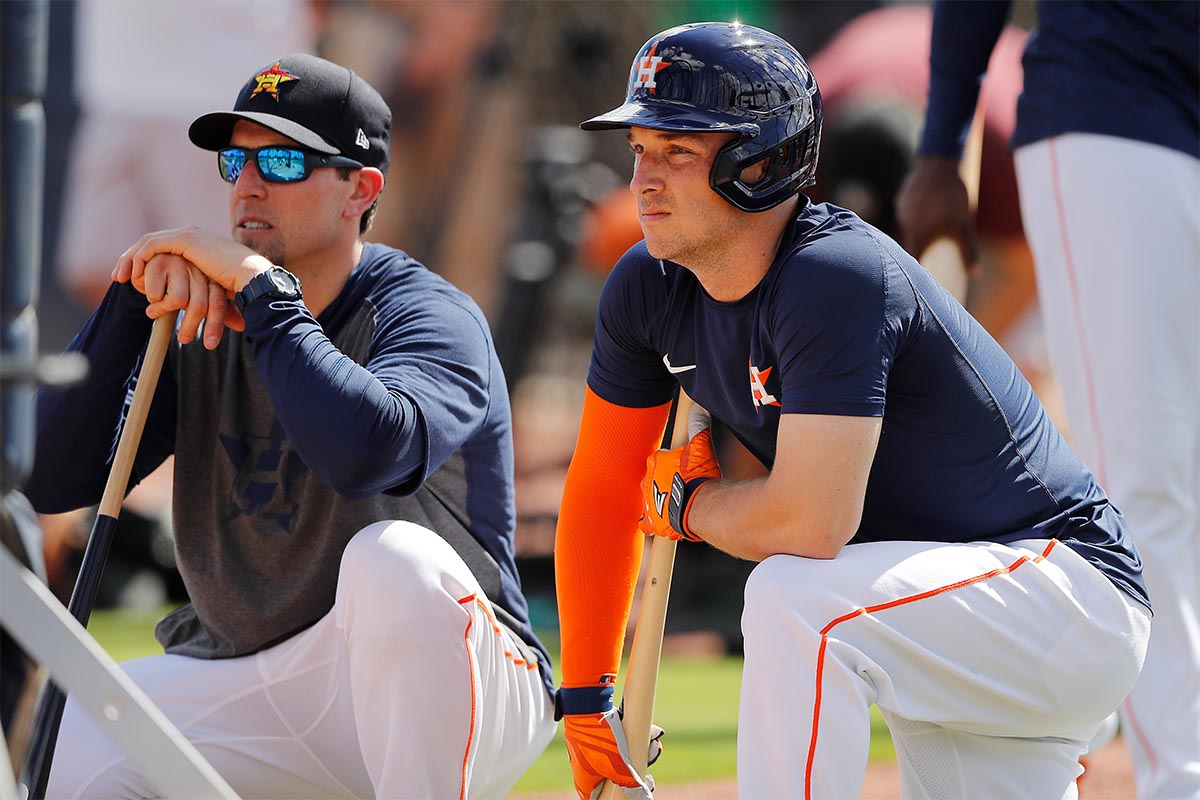
Alex Bregman
Third Baseman and Shortstop, Houston Astros
Trout eked out the AL MVP over Alex Bregman last year, winning 17 first-place votes to Bregman’s 13. A case can be made that the Houston Astros infielder was robbed. He actually had a higher WAR than Trout (9.1 to 8.2), and while that could be explained away by the fact that he played 22 more games, durability is a relevant factor in MVP consideration. As is team success, and the Astros lineup — the second-best in baseball history, after the 1927 New York Yankees — could count on Bregman’s name (and 1.015 OPS) in the lineup card each day. All of that said: as the best of the Astros and an outspoken Twitter personality, Bregman is the face of the team’s sign-stealing scandal. His apology for cheating (and Jose Altuve’s apology, and owner Jim Crane’s apology, and on and on) felt forced and unsympathetic, and provided little catharsis for fans of opposing teams. In a comically fortunate twist, he and his teammates now get to bat in stadiums without fans there to boo. Will “vigilante” pitchers bean Astros? Will Bregman and co. go on an F-you tour and head to their third World Series in four years? Can we take any of their success seriously? Buckle up.
Mookie Betts
Right Fielder, Los Angeles Dodgers
Meet the new $365-million man. When the Dodgers traded a couple upper-tier prospects to the Boston Red Sox for a year rental of Betts, they were betting that the franchise’s constants — palm trees and contention — would compel Betts to sign an extension at the end of 2020. As it turned out, he didn’t need to play a single official game in Dodger blue before committing to 13 years (that’s right, Michael Jordan will be 70 at the end of the arrangement) with the ball club. For the Dodgers, it’s a no-brainer. They now have two of the top-five position players in the entire league in their outfield, and for the Boston Red Sox, it’s a woeful sign of what could have been had a franchise valued at $3.3 billion been willing to pay market value for their best homegrown player in decades.
Cody Bellinger
Outfielder and First Baseman, Los Angeles Dodgers
Everyone on this list loves baseball. That’s sort of how they got so good at it. So it stands to reason that they’re not excited to play 100 games less this year. But if anyone here can enjoy it and use that shortened season to his advantage, it’s the reigning NL MVP. Cody Bellinger had one of the best starts to an MLB season last year in recent memory, slashing .370/20/54 in the first 60 games of 2019. He slipped mightily on the backend (finishing with just 13 home runs over the next 100 games) and it’s possible that if that season had extended another month, Christian Yelich would have eventually surpassed him. But according to recent reports, Bellinger has spent the lockdown studying exactly what he did to attain such great success in the first half of 2019, and is intent on replicating it out of the gate.
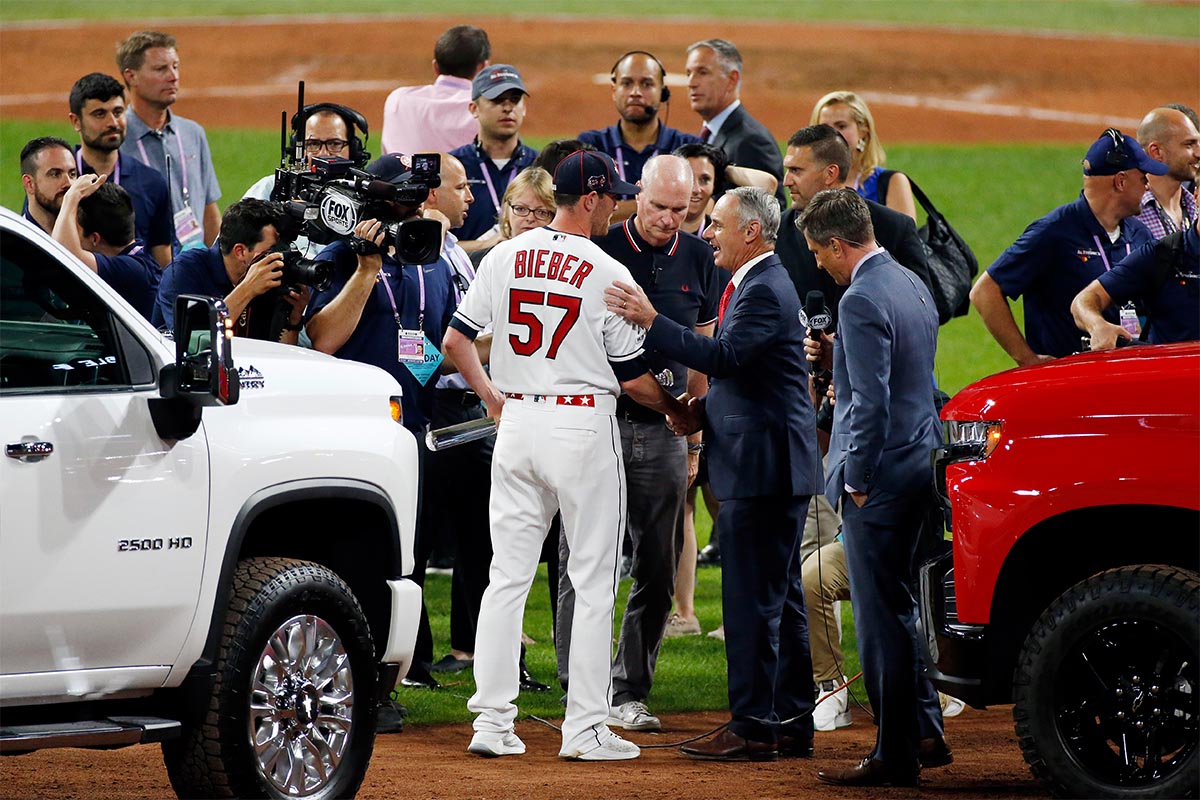
Shane Bieber
Pitcher, Cleveland Indians
Haven’t heard of him? That’s okay. He’s a 25-year-old starter making just $625,000 a year for the Cleveland Indians. But he’s a budding star, too, and while he isn’t destined to become as famous as a certain Canadian with the same surname, he’s well on his way to becoming the best AL pitcher not named Gerrit Cole. Bieber won the All Star Game MVP last year (he’s one of six in MLB history to win it in his only appearance — that distinction will last only another year for him), and he’s the latest, greatest example of the Indians pitching staff figuring out how to craft top-notch homegrown hurlers.
Aaron Judge
Right Fielder, New York Yankees
He hits balls 496 feet. He doesn’t even have to jump when he robs home runs. Aaron Judge is what would happen if you gave a kindergartener a crayon and asked him to draw his favorite baseball player. He’s even managed to move mountains within the franchise itself, which historically trends a tad uptight. The Yankees stunned their own fanbase when they unveiled the Judge’s Chambers back in 2017, and according to clubhouse intel, Judge has been the de facto dugout DJ for several seasons now (coming off years of a quiet locker room). As the face of the Baby Bombers, though — the core of which includes Gary Sanchez, Gleyber Torres, Clint Frazier, Luis Severino and Chad Green — and the perfect position-player complement to Gerrit Cole, Judge needs to stay healthy for this 60-game season and produce in the playoffs. If the Yankees take home the coronavirus crown, it isn’t a stretch to say that a multi-hundred-million-dollar extension and the captaincy are waiting for him in the offseason.
Trevor Bauer
Pitcher, Cincinnati Reds
At this point in his career, Trevor Bauer is probably the least talented baseball player on this list. There’s no shame in that. Everyone else selected here is absolutely dominant, and that’s by design. (Unlike, say, J.R. Smith in the NBA, baseball’s most entertaining players tend to also be the best.) But despite his 6.39 ERA last year, and a downward spiral since he logged a 2.21 in 2018 (and finished sixth in AL Cy Young voting), Bauer is as relevant as ever. The enigmatic right-hander — who popularized warming up with a wobbly “shoulder tube” and credits his understanding of a baseball’s mechanics to his chemical engineer father, Warren Bauer — is a social-media warrior who has zero qualms calling out Commission Rob Manfred on Twitter. From thoughtful grievances on the make-up of baseballs to labor disputes to the league’s mishandling of Black Lives Matter concerns, Bauer is the watchdog fans didn’t even know they needed.
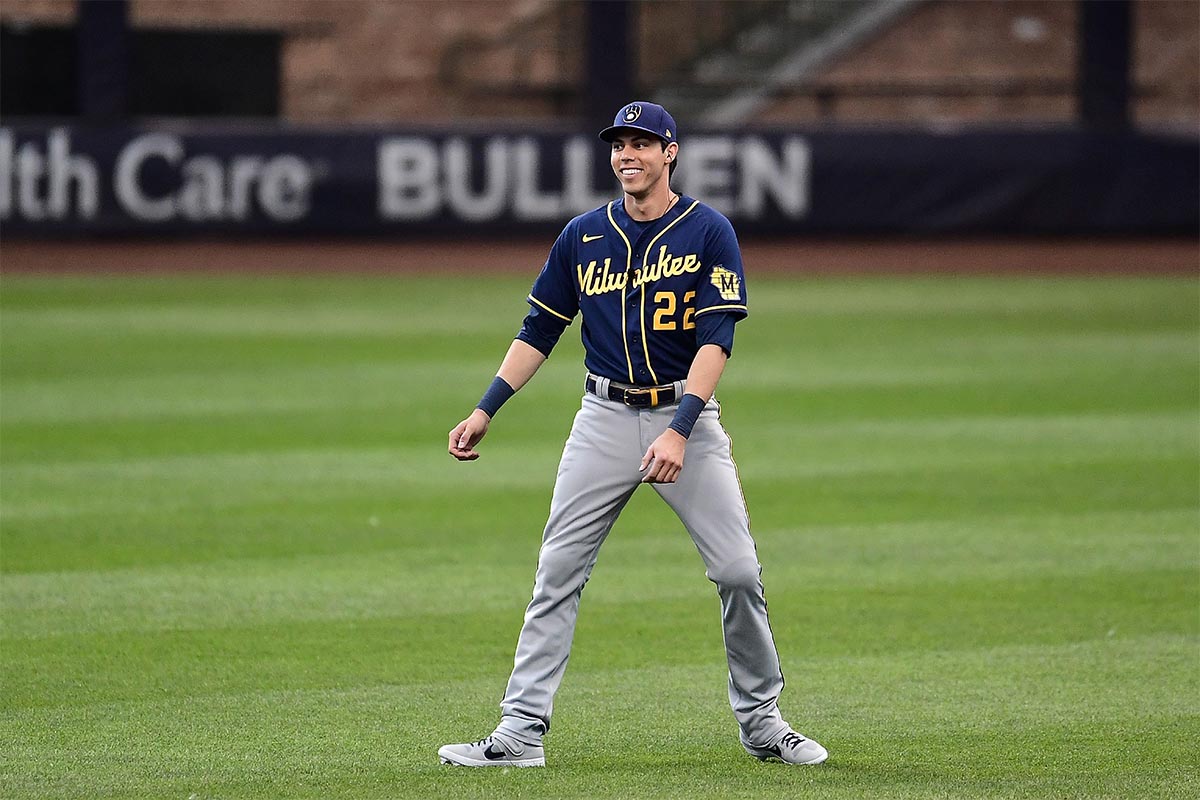
Christian Yelich
Outfielder, Milwaukee Brewers
It’s hard to believe that Christian Yelich was the fourth-best player on the Miami Marlins just three years ago. But since the Derek Jeter regime began in South Beach and management shipped Giancarlo Stanton to the Yankees, Marcell Ozuna to the St. Louis Cardinals, J.T. Realmuto to the Philadelphia Phillies and Yelich to the Milwaukee Brewers, Yelich has been the best of the bunch — if not the best player in the National League. Unlike some of the splashy, “He’s only 22?!” stars that are now taking the league by storm, the 27-year-old Yelich has followed a more traditional career arc, reaching his prime thanks to a slow, steady incline and the addition of some serious power (over the last two years, he has 80 home runs and a slugging percentage of .631). One big reason he got here? Barry Bonds. Check out this video, where Yelich explains the drill Bonds taught him that changed his career.
Josh Donaldson
Third Baseman and Designated Hitter, Minnesota Twins
The Minnesota Twins’ single-season home-run record (they hit 307 dingers last year, which edged out the Yankees’ 306-homer effort) is safe for at least one more season. But accolades aside, the team will be even more dangerous this year: the best home-run-hitting lineup ever just added one of the best bashers in the league in Josh Donaldson, who returned to form last year with 37 mashes after some regression from his MVP season in 2015. Expect lots of dents in Target Field’s empty left field seats. The Twins, ranked in most projections as the next best team after MLB’s “Big Three” — the Dodgers, Yankees and Astros — are hoping the 33-year-old Donaldson can help them move past their recent postseason woes.
Whether you’re looking to get into shape, or just get out of a funk, The Charge has got you covered. Sign up for our new wellness newsletter today.
